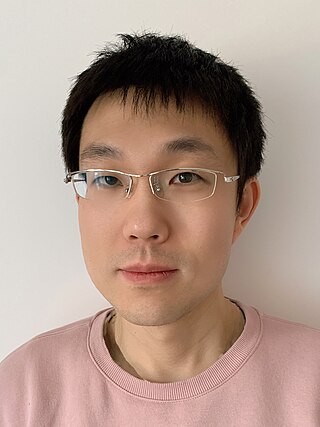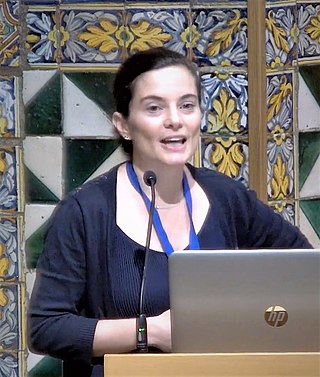Related Research Articles

David Alan Leigh FRS FRSE FRSC is a British chemist, Royal Society Research Professor and, since 2014, the Sir Samuel Hall Chair of Chemistry in the Department of Chemistry at the University of Manchester. He was previously the Forbes Chair of Organic Chemistry at the University of Edinburgh (2001–2012) and Professor of Synthetic Chemistry at the University of Warwick (1998–2001).
The Harrison–Meldola Memorial Prizes are annual prizes awarded by Royal Society of Chemistry to chemists in Britain who are 34 years of age or below. The prize is given to scientist who demonstrate the most meritorious and promising original investigations in chemistry and published results of those investigations. There are 3 prizes given every year, each winning £5000 and a medal. Candidates are not permitted to nominate themselves.
Matthew Jonathan Rosseinsky is a British academic who is Professor of Inorganic Chemistry at the University of Liverpool. He was awarded the Hughes Medal in 2011 "for his influential discoveries in the synthetic chemistry of solid state electronic materials and novel microporous structures."
Robert Paton won the 2015 Harrison-Meldola Memorial Prize awarded by the Royal Society of Chemistry. Up to three Harrison-Meldola Memorial Prizes are awarded each year. Paton received the OpenEye Outstanding Junior Faculty Award from the American Chemical Society COMP division in fall 2015.

James Robert DurrantFRSC FLSW is a British photochemist. He is a professor of photochemistry at Imperial College London and Sêr Cymru Solar Professor at Swansea University. He serves as director of the centre for plastic electronics (CPE).
Claire Sandrine Jacqueline Adjiman is a professor of Chemical Engineering at the Department of Chemical Engineering at Imperial College London and a Fellow of the Royal Academy of Engineering.
Charlotte Williams is a British scientist who holds the Professorship of Inorganic Chemistry at the University of Oxford. Her research focuses on the synthesis of novel catalysts with an expertise in organometallic chemistry and polymer materials chemistry.
Rachel O'Reilly is a British chemist and Professor at the University of Birmingham. She works at the interface of biology and materials, creating polymers that can mimic natural nanomaterials such as viruses and cells. She is a Fellow of the Royal Society of Chemistry and of the Royal Society.
Camille Petit is a Reader in Materials Engineering at Imperial College London. She designs and characterises functional materials for environmental sustainability.
Rebecca Jane Miriam Goss is a British organic chemist and professor at the University of St. Andrews recognized for her contributions to discovering and engineering biosynthesis of natural products, particularly anti-infectives, through the integration of synthetic biology and chemistry. Among other achievements and awards, Dr. Goss won the 2006 Royal Society of Chemistry Meldola Medal.
Helen H. Fielding is a Professor of physical chemistry at University College London (UCL). She focuses on ultrafast transient spectroscopy of protein chromophores and molecules. She was the first woman to win the Royal Society of Chemistry (RSC) Harrison-Meldola Memorial Prize (1996) and Marlow Award (2001).
Paula Jane Booth is an English chemist who holds the Daniell Chair of Chemistry at King's College London and is Head of Department. Booth was awarded a Philip Leverhulme Prize in 2003, a Royal Society Wolfson Research Merit Award in 2008 and an ERC Advanced grant in 2012 for her novel work on investigating the mechanisms of biological self-assembly.

Natalie Stingelin, Fellow of the Materials Research Society and Royal Society of Chemistry, is a materials scientist and current chair of the School of Materials Science and Engineering at the Georgia Institute of Technology, the University of Bordeaux and Imperial College. She led the European Commission Marie Curie INFORM network and is Editor-in-Chief of the Journal of Materials Chemistry C and Materials Advances.
Andrew L. GoodwinFRS is a university research professor and professor of materials chemistry at the University of Oxford.

Elena Besley is a British scientist who is Professor of Theoretical and Computational Chemistry at the University of Nottingham. She holds a Royal Society Wolfson Fellowship and is Associate Editor of Nano Letters.
Matthew John Fuchter is a British chemist who is a Professor of Chemistry at the University of Oxford. His research focuses on the development and application of novel functional molecular systems to a broad range of areas; from materials to medicine. He has been awarded both the Harrison-Meldola Memorial Prize (2014) and the Corday–Morgan Prizes (2021) of the Royal Society of Chemistry. In 2020 he was a finalist for the Blavatnik Awards for Young Scientists.
Susan Perkin is a British chemist who is a Professor of Physical Chemistry at the University of Oxford. Her research considers the physics of liquids and soft matter. She was awarded the 2016 Harrison-Meldola Memorial Prize and named the Soft Matter Lecturer of 2018. In 2015 Perkin was awarded a European Research Council starting grant and in 2020 she was awarded a European Research Council consolidator grant.

Sihai Yang is a professor in the College of Chemical and Molecular Engineering at Peking University. His research in general is based on Inorganic and Materials Chemistry where he and his group investigate on the design and synthesis of novel Metal Organic Frameworks (MOFs) and zeolites for potential applications in gas adsorption, catalysis and industrial separations.

Clémence Corminboeuf is a Swiss chemist who is Professor of Computational chemistry at the École Polytechnique Fédérale de Lausanne. She was awarded the Swiss Chemical Society 2021 Heilbronner-Hückel Award.
Aron Walsh is a chemist known for his research in the fields of computational chemistry and materials science.
References
- 1 2 "Imperial strengthens expertise in computational chemistry and drug discovery | Imperial News | Imperial College London". Imperial News. Retrieved 2018-06-01.
- 1 2 3 4 5 "RSC Harrison-Meldola Memorial Prizes". www.rsc.org. Retrieved 2018-06-01.
- ↑ K.E., Jelfs (2010-03-28). Modelling the growth of zeolitic materials. discovery.ucl.ac.uk (Doctoral). Retrieved 2018-06-01.
- ↑ "Kim Jelfs - Cooper Group - University of Liverpool". www.liverpool.ac.uk. Retrieved 2018-06-01.
- ↑ "Phases 1, 2, 3 +". www.directedassembly.co.uk. Retrieved 2018-06-01.
- ↑ "Grant winners - 7 November 2013". Times Higher Education (THE). 2013-11-07. Retrieved 2018-06-01.
- ↑ "Four Imperial academics celebrate winning European Research Council grants | Imperial News | Imperial College London". Imperial News. Retrieved 2018-06-01.
- 1 2 "ERC FUNDED PROJECTS". ERC: European Research Council. Archived from the original on 2018-07-05. Retrieved 2018-06-01.
- 1 2 "Research". Jelfs Computational Materials Group. Retrieved 2018-06-01.
- ↑ Santolini, Valentina; Miklitz, Marcin; Berardo, Enrico; Jelfs, Kim E. (2017). "Topological landscapes of porous organic cages". Nanoscale. 9 (16): 5280–5298. doi: 10.1039/C7NR00703E . hdl: 10044/1/45580 . ISSN 2040-3364. PMID 28397915.
- ↑ "Outstanding research projects and people recognised in 2018 President's Awards | Imperial News | Imperial College London". Imperial News. Retrieved 2018-06-01.
- ↑ "Top honours for three Imperial chemists | Imperial News | Imperial College London". Imperial News. Retrieved 2018-06-01.
- ↑ "Philip Leverhulme Prizes 2019 | The Leverhulme Trust". www.leverhulme.ac.uk. Retrieved 2020-12-15.